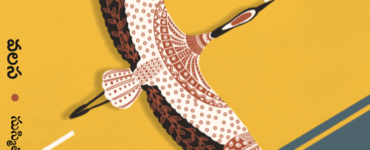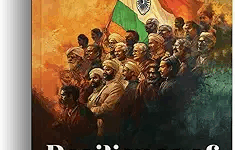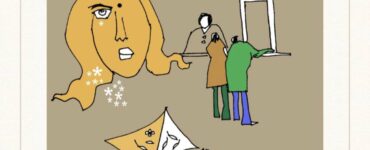Very rarely in literature one comes across writers whom one cannot escape. Whatever our personal choices and tastes are, they occupy a huge space in the literary arena and sit on a high pedestal, challenging our beliefs and intellect. Kavisamrat Viswanatha Satyanarayana is one such example, whose body of writing during the first three quarters of last century was so phenomenal, that we can hardly come across a writer who was so widely admired, criticized and condemned at the same time. While some in contemporary society admired his literary genius, others dismissed him as retrograde and conservative like a stale pickle.
Born on September 10, 1895, in Nandamuru village of erstwhile Madras state, now located in the Krishna District, Viswanatha excelled in whatever genre of literature he touched with his creative mind and golden pen. In the initial years of his career he lived in poverty and his later decision to move to a career as teacher and later as a principal took him to places like Guntur, Khammam and Vijayawada and gave him some respite from the struggles of the mundane existence. For writers and lovers of literature his Maruti Nagar residence where he spent his post retirement life and where he breathed his last on October 18, 1976, remained a literary pilgrimage as long as he lived.
Viswanathq’s supreme confidence in his intellect and genius, perceived by many as intellectual arrogance and brahminical pride sustained him in his mundane struggles like poverty. There was a period in mid- 20th century when many thought they should condemn Viswanatha loudly in order to survive and get recognition as writers. He was a scholar of literatures of Sanskrit and Telugu and English and was familiar with the literary traditions of both ancient India and modern Europe. He was a brilliant writer who constantly experimented with various genres and styles of writing. He lived to a ripe old age, when one could see only the traces of his past glory, often lamenting that the people of the period in which he lived his prime could not understand him and that society considered him a man and a writer of obsolete ideas.
Today, as time has gone by, most people have come to evaluate his work with a historical and objective perspective, keeping the distance needed for it intact. The same historical perspective also demands that one should appreciate anyone who can write with authority and sincerity, choosing to write on issues that are close to his heart and beliefs that form the core of his being. Also a writer is a product of his times and should be examined from the contexts and the time of his contemporary society. He wrote during pre independence times and the British rule had started changing the society and the ensuing transition created conflicts in the age-old spiritual beliefs and the advent of the industrial age and English education in India. While he appreciated the aspect of modern civilization that western way of life has brought in, he resented the loss of essential Indian culture. His writing reflects these dilemmas and conflicts. Had he tried to write what the readers wanted to hear then he could not have written with conviction and could not have persuaded any serious reader of his messages, and eventually would not have stood the test of time.
That leads us to have glimpse of his prolific writing. Starting with an epic Srimad Ramayana Kalpavrikshamu for which he won the prestigious Jnanapeeth award for literature, he wrote tirelessly, creating short poetry like Andhabikshuvu, Nee Radhachakralu, long poems like Andhra Prasasti, Vengi Kshetramu,lyrical poetry like Kinnerasani Paatalu, historical novels like Kashmira Desapu Kathalu, the Puranavaira Granhamala series, his mega novel Veyi Padagalu and other equally renowned historical and social novels like Maa babu, Cheliyali Katta, Baddanna Senani, Haha Huhu and Ekaveera (which was made into a successful Telugu film). Backed by sound scholarship and natural genius for writing he lived life on his own terms and was never bogged down by the controversies. One can say his work reflects upon his depth and scholarship. He was a genius who turned water to elixir, a supremely confident man with a great courage of convictions and a human being for whom humility was never a virtue. He had shown an impatience towards mediocrity and was constantly conscious of his birth, the superior station in life that his caste had bestowed on him, his natural genius and his creative inner self which lead him to lead a life of rigidity, arrogance, uncompromising assertiveness and postures. These qualities were not well-received by his contemporaries at different stages of his writing career and finally lead him towards an old age filled with resentment, disappointment and distress at being constantly riled. He was as complex a human being as he was a writer. His vision was cosmic, his range and canvas were wide and all compassing, his grasp of Indian cultural psyche with three fold attributes – its eternal dharma, ancient yet constant; its spirituality, Himalayan yet vulnerable; and its social fabric, caste-ridden and divided, yet a strange unity weaving through its length and breadth by common threads of myths and legends, folklore and art forms.
Viswanatha stands out even after more than four decades after he left the world as a stalwart presence in twentieth century Telugu Literature. Three of his books will be reviewed in the next issues. The reviewer’s personal preference is for his poetry, which is not the focus of these reviews. First amongst them being Kinnerasani Paatalu, whose lyrical grandeur remains an all-time literary gem. His poetry such as Vengi Kshetram, Andhra Prasasthi etc. must be read before one forms an opinion. He will remain a great presence in literature for centuries to come as he stands on par with Telugu giants like Srinatha mahakavi.
*









Congratulations Syamala garu. It’s a comprehensive essay. Kavisamrat has penned Dramas in Telugu and Samskrta too. I just wanted to add.